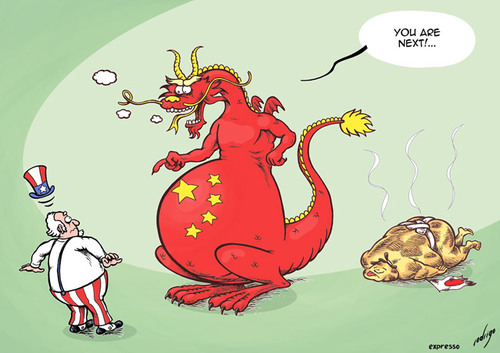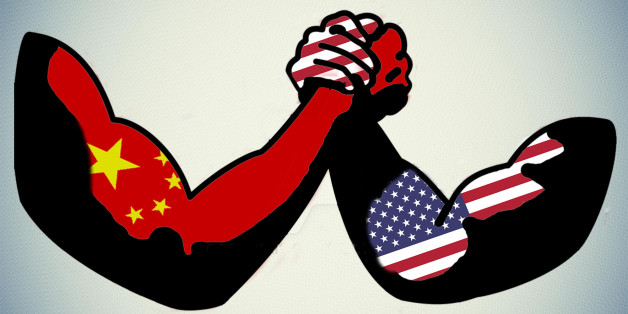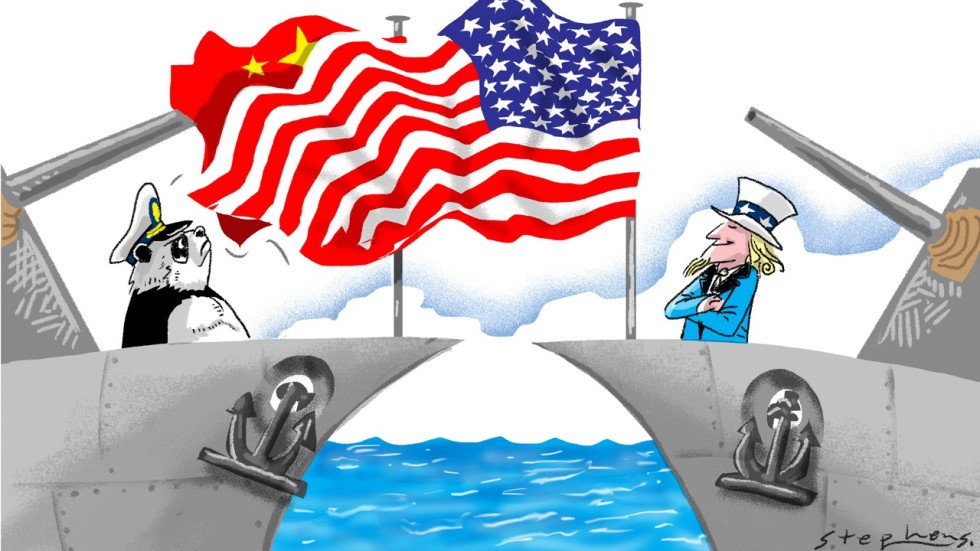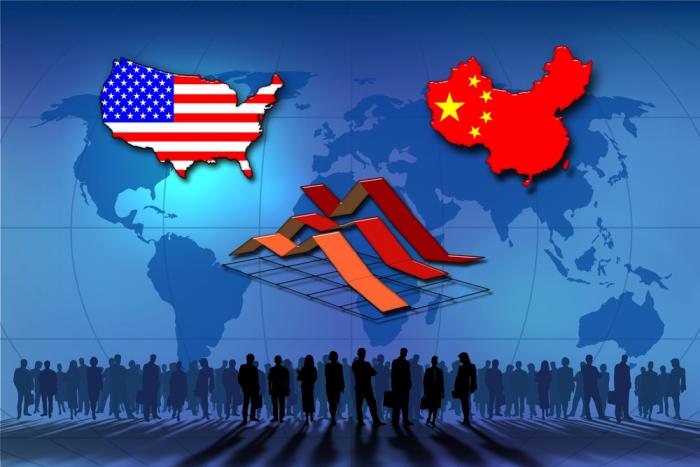 
 字體:小 中 大
字體:小 中 大 |
|
|
|
| 2018/09/21 11:49:55瀏覽513|回應1|推薦1 | |
|
21世紀中國與美國陷入新型經濟冷戰 中國與美國雙方針鋒相對、立場強硬。外界認為,兩國可能會陷入一場曠日持久的新型經濟冷戰。美國認為自己處於上風,而為了避免顯得軟弱,習近平也不願讓步。
由中國進口到美國的貨櫃船的貨櫃箱,在洛杉磯港靠岸下卸。總統的助手說,他認為美國對中國佔據優勢。
華盛頓特朗普總統相信美國正在贏得與中國的貿易戰。但在太平洋兩岸,一種更為悲觀的認識正在佔據上風:世界上最大的兩個經濟體正處於新的經濟冷戰的開始階段,它可能在特朗普離任後,還會持續很長時間。
外交上的僵局令商界和政策界的許多人認為,美國可能在未來幾年內陷入一場曠日持久、損害經濟的貿易戰,他們想知道美國能獲得什麼好處,如果有好處的話。 雙方最新的針鋒相對幾乎沒有留下讓步空間,至少在過渡階段是如此,兩國的立場都很堅定。中國試圖保持強勢,儘管它的經濟處於疲軟狀態,特朗普顯然認為這是一個強迫北京就範的時機。 中國今年的投資、工廠生產和消費支出的增長都在放緩,其經濟增長也隨之放緩。隨著不斷升級的美國關稅的影響加劇,預計情況還將進一步惡化。
美國總統川普,早知如此,何必當初,無理由的對於中國實施高關稅政策,將美國與中國的經貿關係弄亂,也牽連到世界的經濟與貿易體系,這樣一來,201811美國的期中選舉的勝負,對於川普而言是一項嚴重的考驗,這將影響2020年川普是否連任美國總統?
川普的經濟貿易顧問都是些殘兵敗將,在民主黨與共和黨內,皆是垃圾,無人問津的小人,川普卻將他們捧為上賓,延攬他們加入白宮的執政團隊,說得難聽些,就是川普的狗頭軍師,專門出餿主意搞亂中國,
因為他們也看不到中國願意放棄《中國製造2025》的跡象,這是一個旨在爭奪機器人、人工智慧以及其他高科技產業領域主宰地位的工業項目,這些產業一直是美國和歐洲的領域。僅管美國已經確定,這一政策倡議必須制止。
但是站贊在商業利益而言,美國廠商與歐洲廠商,似乎又不願意互相讓步,誰都想一方獨佔市場的利益,難道是中國將以一招半式闖江湖? 取得應有的市場利益,吾人視目已待,美國如何收場?
因為溫言在口,大棒在手(Speak softly and carry a big stick)對於中國毫髮未傷不管用。 因為 中國經濟增幅占世界經濟總增幅的三分之一還要多。美國根本無法承受背離中國的後果。
Trump Has Put the U.S. and China on the Cusp of a New Cold War WASHINGTON — President Trump is confident that the United States is winning its trade war with China. But on both sides of the Pacific, a bleaker recognition is taking hold: The world’s two largest economies are in the opening stages of a new economic Cold War, one that could persist well after Mr. Trump is out of office.
“This thing will last long,” Jack Ma, the billionaire chairman of Alibaba Group, warned a meeting of investors on Tuesday in Hangzhou, China. “If you want a short-term solution, there is no solution.”
Mr. Trump intensified his trade fight this week, imposing tariffs on $200 billion worth of Chinese goods and threatening to tax nearly all imports from China if it dared to retaliate. His position has bewildered, frustrated and provoked Beijing, which has responded with its own levies on American goods. The diplomatic stalemate has many in the business and policy communities considering the possibility that the United States may be in a protracted and economically damaging trade fight for years to come and wondering what, if anything, America will gain. Kevin Rudd, a former prime minister of Australia and an expert on China, said in an interview that 2018 signaled “the beginnings of a war of a different type: a trade war, an investment war and a technology war between the two great powers of the 21st century, with an uncertain landing point.”
Signs of fallout were already apparent: Mr. Ma backed off a pledge he had made in a meeting with Mr. Trump last year to create one million jobs in the United States, telling the Chinese news site Xinhua that “the promise was made on the premise of friendly U.S.-China partnership and rational trade relations,” a premise he said no longer exists. “Trade is not a weapon,” he said.
The latest tit-for-tat leaves little room for concessions, at least in the interim, as both countries dig in their heels and China tries to remain strong, despite an economic softening that Mr. Trump clearly sees as an opening to force Beijing’s hand.
Chinese growth in investment, factory production and consumer spending have all slowed this year, and its economic growth has slowed alongside. The situation is expected to worsen as effects of the escalating American tariffs ramp up.
While the United States made overtures toward China in recent days to talk trade in Washington this month, some officials said they now doubted Beijing would engage again at a high level until after the midterm elections in November, when President Xi Jinping may meet Mr. Trump on the sidelines of an economic summit meeting in Buenos Aires. Mr. Trump himself seemed to dangle the prospect that he, and he alone, could broker a resolution that threatened to cause economic pain to companies and consumers on both sides of the Pacific.
“Hopefully, this trade situation will be resolved, in the end, by myself and President Xi of China, for whom I have great respect and affection,” Mr. Trump said in his statement announcing the tariffs. Yet it is not clear that either side will see a reason to back down. Aides to Mr. Trump say the president believes that the United States has the upper hand on China, with an ability to impose tariffs on a far larger number of goods than the Chinese can match given that America imports far more than it exports. And while the tariffs are unpopular with Republican lawmakers, farmers and manufacturers, his trade approach remains popular with his political base. The Chinese side has its own political reasons to avoid capitulation. Acceding to Mr. Trump would be considered a sign of weakness for Mr. Xi, according to analysts.
And they see no sign that China is willing to give up on Made in China 2025, an industrial program that aims for dominance in robotics, artificial intelligence, and other high tech industries that have been the domain of the United States and Europe and that Mr. Trump has identified as a policy initiative that must be stopped. While Chinese officials have expressed a willingness to get rid of the name Made in China 2025, they have been much more cautious about accepting limits on some of the crucial features of the country’s industrial policy, like big loans from state-owned banks at very low interest rates to favored industries. Inside the White House, there remains a pitched battle between those who want to make a deal with Beijing and those who are determined to keep piling on pressure to force a more radical change in its trade practices. At the moment, the hard liners have Mr. Trump’s ear. “You would expect the administration to have tabled a negotiating text with a clear set of commitments, but that has apparently not been done,” said Daniel M. Price, a former trade adviser to President George W. Bush. “There are some in the administration who see tariffs as an end in themselves.”
Mr. Price said the Trump administration had done a good job of cataloging China’s abuses: theft of intellectual property, forced transfer of technology from foreign companies, predatory joint venture agreements. But it has failed to marshal a coalition to confront China, instead provoking separate trade fights with the European Union, Japan, Canada and Mexico by imposing tariffs on steel and aluminum and threatening additional taxes on imported cars. Doing this without the E.U. and Japan fully on board as though Chinese unfair trade practices were only a bilateral problem is wrongheaded and certainly less effective,” he said. “But it’s very hard to galvanize your allies when you impose steel and aluminum tariffs on them and threaten auto tariffs.”
For China, a complicating factor is figuring out who has influence in Mr. Trump’s White House. Treasury Secretary Steven Mnuchin, who has been leading the negotiations, invited China’s top trade negotiator, Liu He, to Washington for a meeting next week, even though his last visit ended badly when Mr. Trump spurned a deal that would have cut the American trade deficit with China. Mr. Mnuchin believes the United States must be open to talks as long as China is willing to address structural issues, including the trade gap between what America exports and what it imports, pressure on American companies to hand over valuable technology as a condition for doing business in China and intellectual property theft.
It is not clear whether Mr. Liu will visit Washington next week. But even if he does, people who have spoken to Chinese officials said the unraveling of the agreement Mr. Liu believed he had struck on his last visit would make him reluctant to make any deal this time. “The Chinese deep learning from that is, ‘We should not substantively re-engage until the administration has its internal house in order,’” said Mr. Rudd, who is now the president of the Asia Society Policy Institute. After months of bruising encounters with Mr. Trump, Mr. Rudd said Chinese officials recognized that they would need to change their policies on trade and market access. But he said Mr. Xi was no less likely than Mr. Trump to risk losing face by giving in to American pressure. “China has politics too,” he said. “The whole notion of ‘back down’ and ‘face’ is as live a consideration within internal Chinese politics as it is within U.S. politics.”
Mr. Trump’s aggressive moves drew intense criticism from some quarters at home. Fred Smith, the chief executive of FedEx and an enthusiastic supporter of the president’s tax cuts, called his trade policy a form of mercantilism that was “worrisome to everyone.”
But Mr. Trump has shown little sign of changing course. While there are differences among members of his economic team, there is a broad consensus in the administration about taking a hawkish stance toward China. Some point to evidence that the trade pressure on China was making it less adventurous in the East China Sea, where it spars regularly with Japan .
Mr. Trump has forged ahead with tariffs even while saying that the trade tensions were making China less cooperative in pressuring North Korea on its nuclear arsenal — a claim that puzzles some of his own advisers.
“They have been helpful; I hope they’re still helpful,” Mr. Trump said at a news conference Tuesday with the Polish president, Andrzej Duda. “There’s a question about that.”
But the president added, “It got to a point where the numbers were too big.” China “rebuilt their country with tremendous amounts of money pouring out of the United States,” he said. “And I’ve changed that around.”
|
|
| ( 時事評論|國際 ) |




















